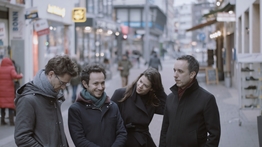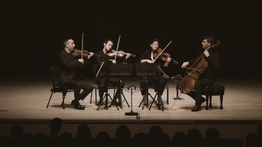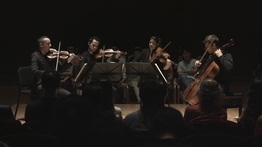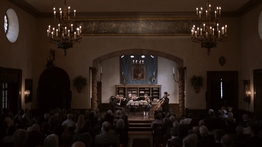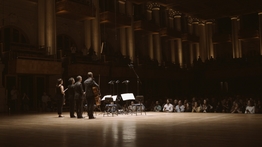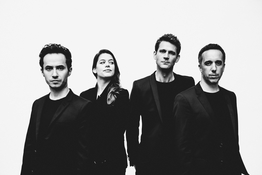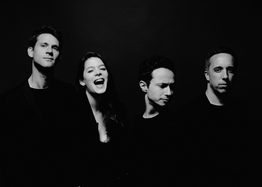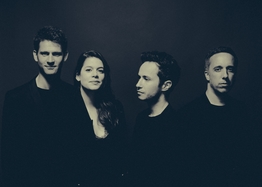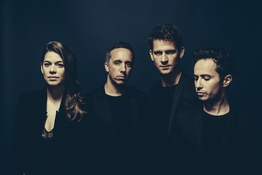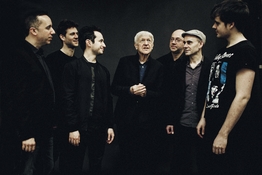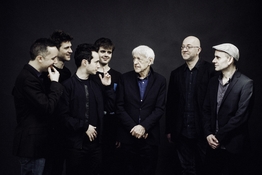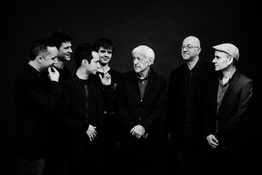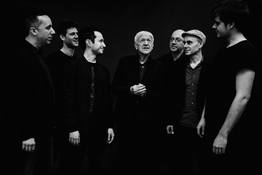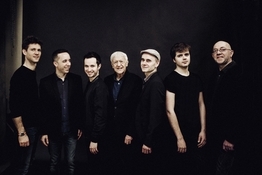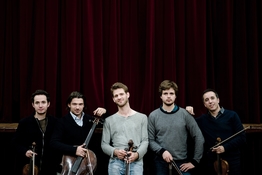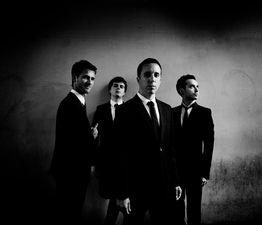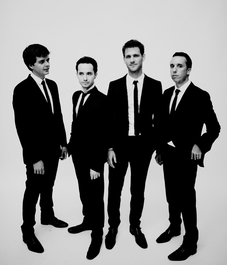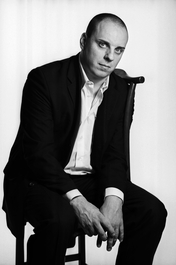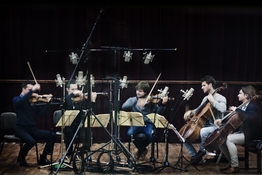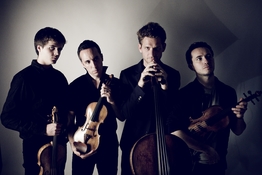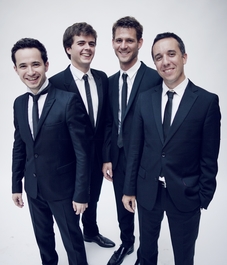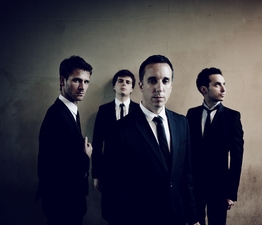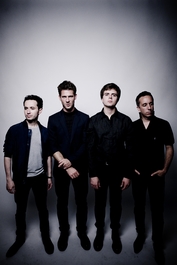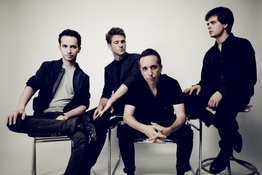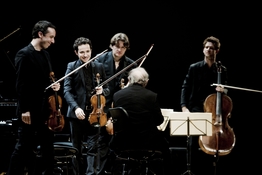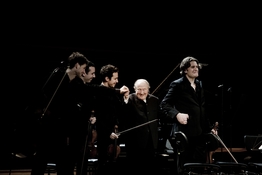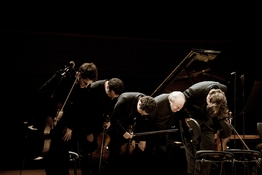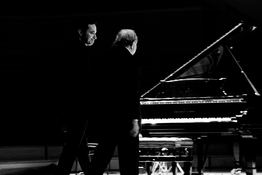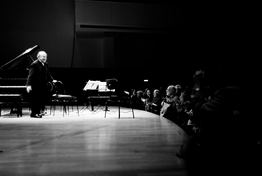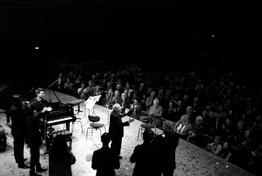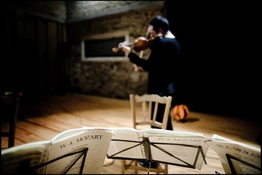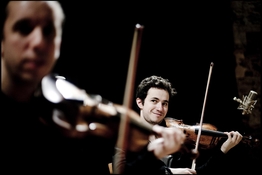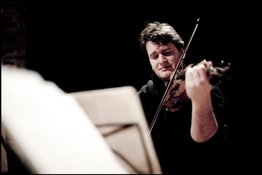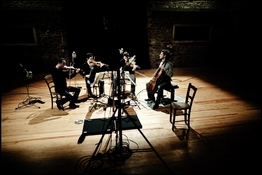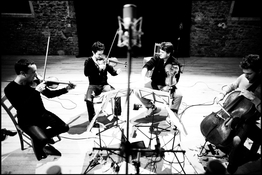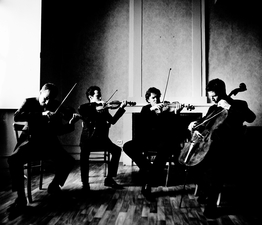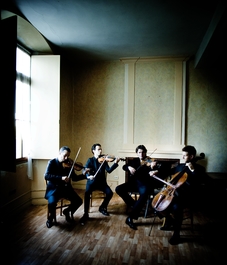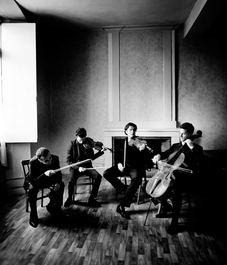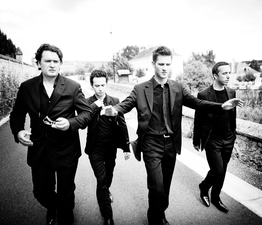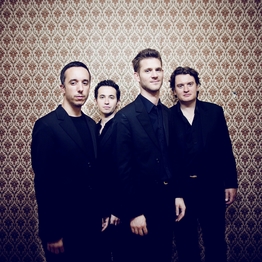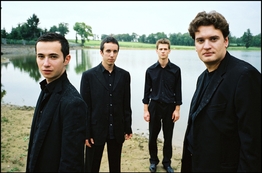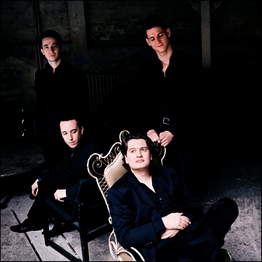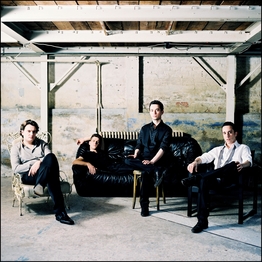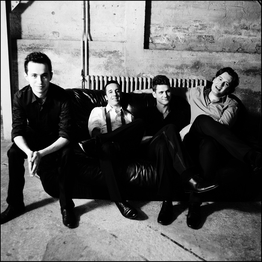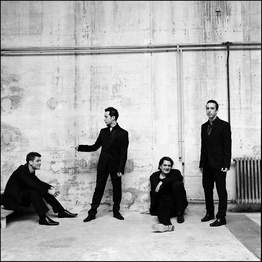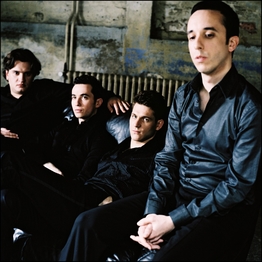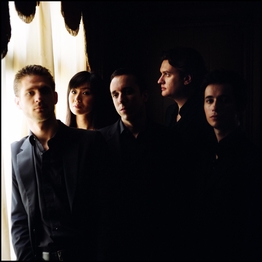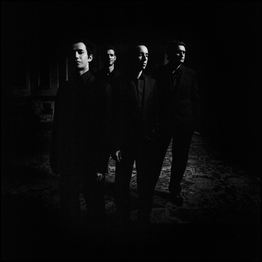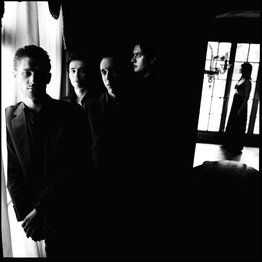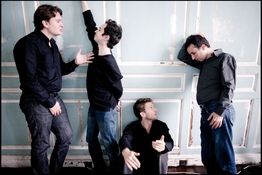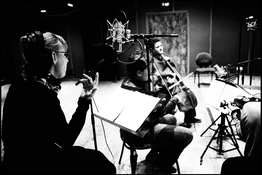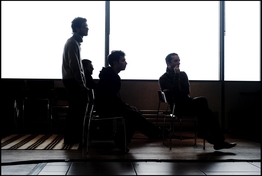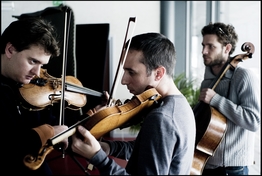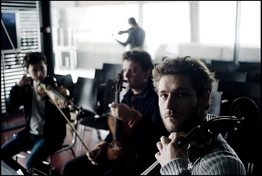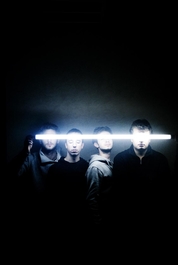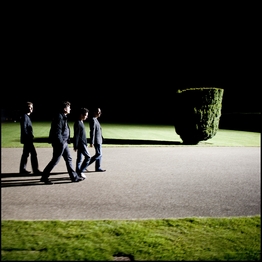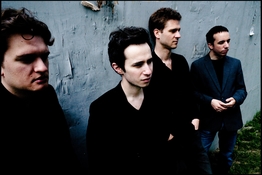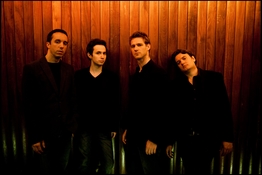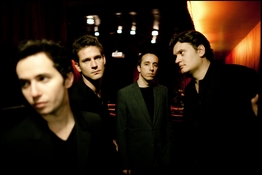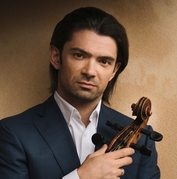

Quatuor Ébène
News
Mozart: String Quintets
Quatuor Ebène welcomes a favourite colleague, viola player Antoine Tamestit, for two of Mozart’s six string quintets – No 3 in C major, K 515 and No 4 in G minor, K 516.
Tamestit and the quartet first became acquainted in 2004, as participants in the ARD International Music Competition in Munich. Their last joint album was ‘Round Midnight, a 2021 release which won a Gramophone Award for its thrilling exploration of diverse strands of 20th century music. When the Ebène released a Mozart album some time ago, including the ‘Dissonance’ Quartet, Classic FM wrote: “For readings that combine the best of the 'old' and the 'new' it is difficult to imagine these remarkable performances ever being surpassed,” while a performance of the Quintet K 515, at London’s Wigmore Hall prompted Bachtrack to write that: “Its long arching phrases were captured brilliantly here by the Ebène Quartet and Antoine Tamestit, who brought out not just the work’s luminous elements but also its darker, wistful undercurrents. One could not have hoped for a better rapport between the players.”
Pierre Colombet, first violinist of Quatuor Ebène, provides further insights into that rapport. “The string quartet as a genre is ruthless in its demands: if a single note is even slightly out of tune, or if the balance is a little off, the whole house of cards tumbles down. When a fifth member joins the ensemble it is always cause for celebration, especially if it’s an additional viola to bring further roundness and warmth to the middle voices: the sound grows in substance and vibrancy – the quartet gains a marvellous complement. And a musician like Antoine always brings new ideas and wisdom to refresh or expand our vision of a work.”
Speaking of the two quintets on the album, both composed in 1787, Colombet describes K 515 as “radiant and energetic, exuding elegance and grace,” a score in the same life-affirming vein as Die Zauberflöte, while K 516 offers “perfection in its counterpoint and the dialogue between the five instruments … already Romantic in spirit, tragic and sometimes sceptical ... We all see it as a peak of achievement in chamber music, a work for which we have the utmost admiration, as an inspiration for our musical life.”
Beethoven: The Complete String Quartets
Recorded in late 2020 at the Philharmonie in Paris, home city of Quatuor Ébène, this complete DVD cycle of the Beethoven String Quartets complements the complete audio cycle recorded by the Ébène in 2019 and early 2020; entitled Beethoven Around the World, the CDs drew on performances in Paris and six other great cities: Vienna, Philadelphia, Tokyo, São Paulo and Melbourne.
Quatuor Ébène’s original plan had been to mark Beethoven’s 250th anniversary with a touring schedule running from Spring 2019 to December 2020 and encompassing over 120 concerts in 21 countries. Inevitably, the pandemic severely compromised these ambitious plans, but the Ébène was proud to set the seal on its landmark project with these 6DVDs, made in collaboration with director Sébastien Glas, director of photography Julien Jaunet and audio producer Vincent Mons. As the players said when the Beethoven tour was originally announced: “The quartets are 16 masterpieces that form an eternally modern artistic canon of unparalleled breadth and depth – they translate the purest humanity into music. In themselves they represent an odyssey, a round-the-world voyage.”
The impact of the Ébène’s approach to Beethoven – both exhilarating and illuminating – was summed up by the respected magazine The Strad, which is devoted to string playing, when it reviewed Beethoven Around the World:
“Having relished the white-hot interpretative intensity and fantasy of these performances for several weeks now, I cannot imagine returning to old favourites … without wearing a pair of rose-tinted headphones. The Ébène – violinists Pierre Colombet and Gabriel Le Magadure, violist Marie Chilemme and cellist Raphaël Merlin – regularly captures a sense of musical weightlessness, as though in recreative free-flow. Traditional furrowed-brow, espressivo, cantabile-driven values barely get a look in, as they peel back layers of stultifying accretion and rediscover the shock value of this music for a contemporary audience.
“If that begins to sound as though they may simply have taught these centuries-old scores a few new musical tricks, then think again. Far from imposing their ideas in a conjectural manner or attempting to recreate how this music might have sounded in the early 19th century, they appear to have thrown away the semantic rulebook to create fresh, compelling sound worlds from the roots up. The results feel like a metaphor for the composer’s modus operandi – they play not as they should, but as they feel they must.”
‘Round Midnight
The members of Quatuor Ébène went round the world with the complete Beethoven quartets, now they go ‘Round Midnight. This album offers a creatively conceived programme, bringing together major figures from different streams of 20th music: Arnold Schönberg, Henri Dutilleux and four masters of jazz and popular idioms – Thelonius Monk, Cole Porter, Henry Mancini and Victor Young.
The three works in question, all nocturnally-themed, are: Schönberg’s passionate late-Romantic sextet Verklärte Nacht (Transfigured Night), composed in 1899, for which the quartet is joined by viola-player Antoine Tamestit and cellist Nicolas Altstaedt; Dutilleux’s glistening quartet Ainsi la nuit, first heard in 1978 and comprising seven brief movements, and Night bridge, a ‘nocturnal poem for string sextet’ composed by the Ébène’s cellist Raphaël Merlin. It muses on Monk’s jazz standard ‘Round Midnight, dating from around 1940, on Mancini’s ‘Moon River; made famous by the 1961 film Breakfast at Tiffany’s, on Porter’s urbane and haunting ‘Night and Day’, originally a hit in 1932, and on ‘Stella by Starlight’ originally composed by Victor Young for the 1944 film The Uninvited.
Quatuor Ébène’s capacities for crossing genres have already been proven with such albums as Eternal Stories, Fiction and Brazil. As the Pittsburgh Post-Gazette wrote after a 2018 concert which set Thelonious Monk and Miles Davis beside Haydn and Fauré: “… This quartet knows and loves its jazz. The hits rolled into one another smoothly, with cellist Raphaël Merlin acting as emcee … A cello is not a string bass, but Mr Merlin capitalized on the nimbleness of his instrument, conjuring a new feeling to some old favorites. The same can be said of the other members (Pierre Colombet and Gabriel Le Magadure, violins; Marie Chilemme, viola) — it wasn’t a pure reproduction of ‘‘Round Midnight’ or [Wayne Shorter’s] ‘Footprints’, rather, a highly trained string quartet’s impression of the songs ... It was eminently diggable.”
Raphaël Merlin points out that the night, surrounding us with darkness, has a special power to heighten our appreciation of music. “Is there any other time when we listen more closely?” he asks. “Our hearing becomes exceptionally acute, we find ourselves as alert as an animal … especially receptive to new impressions ... It offers all kinds of possibilities to a composer.”
In 2017, Quatuor Ébène even played the programme of ‘Round Midnight (expanded with additional short works by Dutilleux and Salvatore Sciarrino) in a series of concerts in Germany, Austria and Spain where the only light in the hall emanated from the players’ music stands. Especially atmospheric for the audience must have been the moment in ‘Night and Day’ when the four musicians used their strings and bows to recreate the nostalgic repetitive ‘swish’ of a 78 rpm recording.
Beethoven Around the World
Beethoven’s 16 string quartets occupy a place of honour in the chamber repertoire and, like his nine symphonies and 32 piano sonatas, trace his progression through his creative life. 2020 marks the 250th anniversary of the composer’s birth, and Quatuor Ébène is recognising this with an extensive tour, entitled Beethoven Around the World, which runs from Spring 2019 to December 2020. Over that period the French ensemble will give over 120 concerts in a total of 21 countries on six continents, focusing on complete cycles of the quartets from February 2020.
Beethoven Around the World encompasses live recordings for Erato, building a complete cycle, made in seven of the world’s great cities: Vienna (at the Konzerthaus); Philadelphia (Kimmel Center); Tokyo (Suntory Hall); São Paulo (Sala São Paulo); Melbourne (Melbourne Recital Centre); Nairobi, and, with the support of UNESCO, Paris (Philharmonie de Paris). In addition, the tour will provide the subject matter for a documentary film, to be released at the end of 2020 – also the year in which the Quatuor Ébène celebrates its 20th birthday.
The whole idea for Beethoven Around the World began to take shape in 2014, when Quatuor Ébène received an invitation from Carnegie Hall in New York to perform the Beethoven cycle. The ensemble will appear in six concerts at the legendary venue in Manhattan in April and May 2020.
Speaking of the tour, the members of Quatuor Ébène say: “This is where Beethoven goes global. The quartets are 16 masterpieces that form an eternally modern artistic canon of unparalleled breadth and depth – they translate the purest humanity into music. In themselves they represent an odyssey, a round-the-world voyage.” The players believe that the composer’s music “transcends all linguistic, geographical and political borders ... Both modern and timeless, it is universal. It cannot be readily classified as Classical or Romantic, as German, or even as Western, but it is music that expresses itself freely and which addresses the audiences of the future rather than its own time … It can seem complex at first, but everything becomes clear as its essence emerges.”
The ensemble also emphasises that: “The quartet as a genre gives individual players the chance to shine, yet is simultaneously predicated on collaboration and concord: it shows democracy in action. Its emotional and intellectual power is considerable, yet it is also universally accessible as it embodies underlying ideals – enlightenment, fraternity and humanism, as typified by Goethe and by Schiller in his Ode to Joy [the inspiration for the final movement of Beethoven’s 9th Symphony]. At the same time it is informed by Kant’s ideas on morality, goodwill and the categorical imperative, all of which were gaining currency in Beethoven’s time. It also reflects the German philosopher’s view of our relationship with the natural world, which has such resonance for the environmental issues of today.” Appropriately, the tour will be associated with a carbon offset programme devoted to reforestation.
The two quartets on the first album of the complete cycle were recorded in June 2019 in the Mozart-Saal of the Konzerthaus in Vienna, the city that Beethoven made his home and where he died in March 1827. The works in question are op 59 No 1 (also known as his String Quartet No 7) and op 59 No 2 (String Quartet No 8). Composed in 1806, the year after the premiere of the ground-breaking ‘Eroica’ symphony, they are the first two of the set of three ‘Razumovsky’ quartets. These were commissioned by Count Razumovsky, the Russian ambassador to Vienna, who played second violin in a quartet led by Ignaz Schuppanzigh, a friend of Beethoven’s. Schuppanzigh had also formed his own professional string quartet in 1804 with the intention of giving public quartet concerts; this was an innovation, since quartet-playing had until then been the preserve of cultivated amateurs like Razumovsky. Beethoven also took an innovative approach in the ‘Razumovsky’ quartets, writing on an ambitious ‘symphonic’ scale, making considerable technical and intellectual demands, and taking the genre into a new er
The 2016 Gramophone Awards shortlist has been revealed
The prestigious Gramophone Awards shortlist has been announced, showcasing the finest classical recordings over the past year, as chosen by the leading classical music magazine's critics and specialists.
Seventy-two recordings have been shortlisted across twelve categories. The top three recordings in each category will be revealed in next issue of the magazine, which goes on sale on August 12.
There are particularly strong contenders in the Vocal categories, with French soprano Sabine Devieilhe - noted by Gramophone for her "pure, sweet timbre and dazzling virtuosity" - up against the likes of Jonas Kaufmann and Max Emanuel Cencic for her multi-award-winning Mozart album The Weber Sisters (Recital category).
Fresh from singing David Bowie at the BBC Proms in London, French countertenor Philippe Jaroussky is in the running for another prize, this time as one of the cast-members in Il Pomo d'Oro's magnificent triple-album recording of the Handel opera Partenope, welcomed by Gramophone as “a landmark event”.
Joyce DiDonato is a strong candidate for the Solo Vocal category for her live double album from Wigmore Hall Joyce & Tony, with her esteemed recital partner Sir Antonio Pappano at the piano in everything from Italian arias to the Great American Songbook.
In Opera, Pappano's Verdi Aïda, the all-star triple album studio recording from Rome, is a clear frontrunner, with tenor Jonas Kaufmann as Rademes - he is nominated again in the same category for his Pagliacci. Gramophone declared soprano Anja Harteros "the most interesting Aïda on record since Callas"; both she and maestro Pappano have been nominated for the public-voted Artist of the Year.
Among the Instrumental selections, Bertrand Chamayou does his countryman Ravel proud in the complete works for solo piano on a double album.
The Concerto category sees young Norwegian violin virtuoso Vilde Frang holding her own alongside the likes of Janine Jansen, with the recent Gramophone Recording of the Month, her "urgently communicative" Britten and Korngold Violin Concertos.
The Chamber category sees two Erato string quartets nominated for two sublime releases: the French Quatuor Ebène for their Schubertalbum featuring baritone Matthias Goerne and cellist Gautier Capuçon, and the German Artemis Quartet's searing Brahms, their last recording with the late, lamented violist Friedemann Weigle, which cellist Eckart Runge sees as "imbued with a sense of warmth, immediacy, friendship and love that is interwoven with a more spiritual, timeless beauty”.
See the full shortlist of the 2016 Gramophone Award nominees here.
Quatuor Ebène: "Matthias Goerne is a singer who can walk on water."
The Ebène Quartet's new Schubert album traces the links between Schubert's instrumental chamber music and his mastery of song, placing the monumental String Quintet D956 (guest cellist Gautier Capuçon) alongside five lieder, including the transcendent Death and the Maiden, all in world-premiere arrangements for baritone and strings by the Ebène's cellist Raphaël Merlin.
"He is not only a gifted cellist, but a fantastic arranger and composer," said baritone Matthias Goerne of Merlin. "I have to say it's so astonishing. You have even more possibilities with the strings compared to the original versions."
The admiration was mutual: "Matthias is the king of baritones!" says violinist Pierre Colombet.
"It was a huge privilege for us to have Matthias Goerne sing these arrangements. He is a singer who can walk on water," enthused the Quartet.
Quatuor Ebène's Schubert album, featuring Matthias Goerne, Gautier Capuçon and double bassist Laurèn Durantel, is out now.
The Ebène Quartet record Schubert with Matthias Goerne and Gautier Capuçon
Warner Classics & Erato artists sweep the Victoires de la Musique Classique
Warner Classics and Erato artists were out in full force at the 2016 Victoires de la Musique Classique - the French classical GRAMMYs.
The labels had more artists nominated than any other recording company, with several giving live performances throughout last night's glittering ceremony broadcast to a televised and radio audience of millions on France2 and France Classique.
Bertrand Chamayou took the coveted final prize of Solo Instrumentalist of the Year. "I'm moved to accept this award in my hometown," he said. "I'd like to thank all the Toulousains who supported me from the beginning...I've just released a new album of Ravel that was recorded here in Toulouse."
Chamayou also played a movement of the Liszt Piano Concerto live during the ceremony, with conductor Tugan Sokhiev and the Orchestre National du Capitole de Toulouse, in a performance dedicated to the late French composer-conductor Pierre Boulez.
He is now a three-time Victoires de la Musique Classique laureate, having previously won 'Revelation of the Year, Solo Instrumentalist' in 2006, and 'Recording of the Year' in 2012.
Another Ravel album on Erato, Daphnis et Chloé & La Valse, was hailed Recording of the Year: a triumph for the orchestra and chorus of the Opéra National de Paris and their conductor Philippe Jordan.
The recording project grew from performances of a ballet production of Daphnis et Chloé at Paris’ Opéra Bastille in Spring 2014: Philippe Jordan, Music Director of the Paris Opéra, was conducting a complete ballet for the first time and the choreographer, Benjamin Millepied – known to a wide audience for his work on the Oscar-winning film Black Swan, starring his wife, Natalie Portman – was undertaking his first major project for the Opéra before assuming his new role as its Director of Dance in Autumn 2014.
Also nominated in this category was the Mozart album The Weber Sisters (Sabine Devieilhe, Pygmalion orchestra and conductor Raphaël Pichon).
Seventeen-year-old trumpet virtuoso Lucienne Renaudin Vary was named Solo Instrumental Revelation of the year. On accepting this award for France’s brightest rising stars, she announced a forthcoming debut album in the planning stages with Warner Classics, a label with a roster of revered trumpet players past and present, notably Maurice André and Alison Balsom.
"I'm so happy to have the opportunity to record a future album based on vocal repertoire, opera and song, and I hope to explore the link between classical trumpet and jazz," she said in a statement. Lucienne also performed the Haydn Trumpet Concerto in E-flat Major as part of the ceremony.
In this category for promising young artists, all three nominees were linked to Warner Classics and Erato. Violinist Camille Berthollet, the winner of the Prodiges competition whose debut album of the same name achieved Gold status in France just weeks after its release, gave a moving live performance of the theme from Schindler's List. Violist Adrien Boisseau, meanwhile, joined the award-winning Ebène Quartet last year and releases his first album as part of the group in April.
Remarkably, the ages of musicians performing in the Victoires de la Musique this year ranged from 17 to 92, with veteran pianist and founder of the Beaux Arts Trio Menahem Pressler receiving a Victoire d'Honneur for Life Achievement - a career spanning more than 70 years. As precise and lively as ever, he accepted the accolade with a live performance of Chopin's A-minor Mazurka Op.17 No.4.
Pressler's 90th birthday celebrations in Paris in 2014 were captured in a live album featuring his chosen chamber music partners the Ebène Quartet. The year 2016 began auspiciously for this living legend with his long-overdue debut with the Berlin Philharmonic at the annual New Year's Eve Concert, now available on DVD from EuroArts.
Warner Classics and Erato congratulate all the award-winners and nominees this year at France's biggest classical music event, the Victoires de la Musique Classique.
Philippe Jaroussky and Antonio Pappano nominated for BBC Music Magazine Awards
The 2016 BBC Music Magazine Awards are now open for public voting: among the nominees are French countertenor star Philippe Jaroussky and Antonio Pappano (and his Aïda cast featuring Anja Harteros, Jonas Kaufmann, Erwin Schrott, Ekaterina Semenchuk and Ludovic Tézier, with the Orchestra dell'Accademia Nazionale di Santa Cecilia).
"Sir Antonio Pappano knows his Verdi – as is in evidence in a performance of the Italian’s Egypt-inspired opera that is as musically brilliant as it is dramatically convincing. The orchestral playing is scintillating, the starry soloists utterly sublime," declared the BBC Music Magazine of Pappano's no-expense-spared studio recording of Aïda from Rome, nominated in the Opera category.
In the Vocal Category, Philippe Jaroussky (along with partners the Ebène Quartet and pianist Jerôme Ducros) is in the running for his eloquent double-album Green. "This labour of love from Philippe Jaroussky is a beautifully conceived and wonderfully sung collection," affirmed BBC Music Magazine. "Jaroussky collates song settings of Verlaine, that most musical of poets, from composers as diverse as Debussy, Massenet, Charles Trenet and Varèse, along with charming rarities in an enticing treasure-trove." (The album also features a duet with French contralto Nathalie Stutzmann.)
The winners will be announced on 5 April at a ceremony in Kings Place, London.
Listen and have your say here. Voting closes 19 February, 2016.
Menahem Pressler receives the 2015 ECHO Klassik Lifetime Achievement Award
Pianist and revered chamber musician Menahem Pressler has been honoured with the ECHO Klassik Lifetime Achievement Award. Pressler will accept in person at a ceremony on 18 October at the Konzerthaus Berlin.
Born in 1923, Pressler founded the legendary Beaux Arts Trio in 1955, making more than 50 recordings with that beloved ensemble. Indefatigable at 91 years old, he continues to perform and give master classes around the world.
One unforgetable moment in this long and illustrious career is Pressler's 90th birthday gala in Paris, 2013, performing with his chosen guests the Ebène Quartet. This momentous and moving occasion was captured on CD and DVD by Erato.
Explaining his extraordinary longevity as a performer, Pressler – who spent 53 years as the pianist of the Beaux Arts Trio – told Piano Mag: “I'm a born pianist, in the most literal sense. I have devoted my life to the piano, to music: this feeds me each day...It is a rich and healthy life when one can devote oneself exclusively to one's art ... I never miss the chance to share and play with others."
See more ECHO Klassik prizewinners here.
Related releases








Upcoming Concerts
Saturday
Tuesday
Wednesday
Friday
Monday
